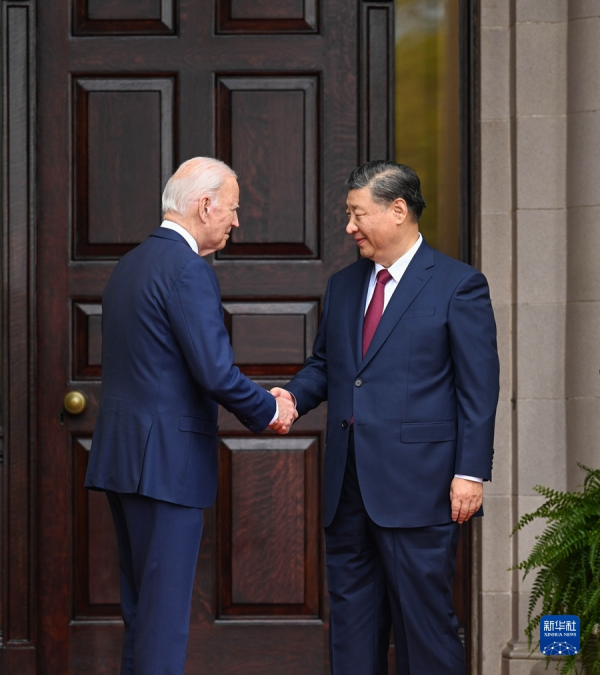During the day, Chinese President Xi Jinping met with U.S. President Joe Biden. President Xi proposed building five pillars for China-U.S. relations, offering a fresh perspective on the two countries’ relationship.

In the evening, President Xi attended a welcome banquet hosted by U.S. organizations and delivered a speech. He provided guidance for advancing China-U.S. friendship.
In today’s world, marked by numerous challenges and uncertainties, the relationship between China and the U.S., the largest developing and developed countries, respectively, is crucial for humanity’s future.
The hope of the China-U.S. relationship lies in the people, its foundation is in the societies.
One hundred and fifty-eight years ago, many Chinese workers came to the U.S. to build the first transcontinental railroad. Eighty-seven years ago, American journalist Edgar Snow courageously reported on the resistance war against Japanese aggression in northern Shaanxi Province, China, sharing the indomitable “voice of the resistance” with the world.
Seventy-eight years ago, China and the U.S., among others, initiated the San Francisco Conference, leading to the founding of the United Nations. During World War II, the nations fought together for peace and justice. U.S. General Claire Lee Chennault led the Flying Tigers in combat against Japanese invaders in China. Meanwhile, Chinese troops and civilians rescued U.S. Lieutenant Colonel James Doolittle and his fellow pilots. This history, forged in blood and fire, underscores that people-to-people ties have built the foundation of China-U.S. relations.
The common interests between China and the U.S. outweigh their differences.
In the spring of 1971, during a table tennis tournament in Japan, U.S. player Glenn Cowan ended up on a bus with the Chinese team. Chinese player Zhuang Zedong presented Cowan with a silk-screen portrait of the Huangshan Mountains, and Cowan reciprocated with an American sports shirt.
This encounter led to the American table tennis delegation’s visit to Beijing and the Shenyang Acrobatic Troupe’s visit to the U.S. Later, the Philadelphia Orchestra made its first visit to China.
These events marked the beginning of a wave of friendly exchanges between China and the U.S., underscoring the importance of people in opening the door to bilateral relations.
“I am convinced that once opened, the door of China-U.S. relations cannot be shut again,” President Xi said at the welcome banquet. His speech elicited nearly 20 rounds of long, enthusiastic applause.
In the early 20th century, American professor Milton Gardner spent his childhood in Kuliang, in southeastern China’s Fujian Province. Returning to his childhood hometown was his long-cherished wish. In 1992, Xi, then working in Fujian, invited Mrs. Gardner to visit Kuliang. She joyfully reminisced about the past with her husband’s childhood companions.
During World War II, U.S. General Joseph Stilwell joined forces with Chinese troops and civilians. Recently, Chongqing Municipality in southwest China held commemorative events for the 140th birth anniversary of General Stilwell. General Stilwell’s descendants attended in person.
In a reply letter to General Joseph Stilwell’s grandson, President Xi said he was glad to see that General Stilwell’s dedication to China-U.S. friendship has been passed down to the fifth generation of his family.
In his speech, President Xi also reminisced about his first visit to the U.S., staying with the Dvorchaks in Iowa.
He remarked, “For me, they represent America. I have found that although our two countries are different in history, culture and social system and have embarked on different development paths, our two peoples are both kind, friendly, hardworking and down-to-earth. We both love our countries, our families and our lives, and we both are friendly toward each other and are interested in each other.”
Today, China and the U.S. have established 284 sister province/state and city relationships. Up to 300 flights operate between the two countries weekly, with over 5 million travelers annually. Earlier this month, the 6th China International Import Expo (CIIE) hosted the largest U.S. business delegation ever.
During their meeting in San Francisco, the presidents agreed on important points, including increasing direct passenger flights and expanding bilateral exchanges in education, overseas students, youth, culture, sports, and business.
The foundation of any significant endeavor rests with the people. The future of China-U.S. relations will be shaped jointly by the people of both countries.
Regardless of changes in the international landscape, the fundamental desire for exchange and cooperation between the Chinese and American people remains constant. The future of China-U.S. relations depends on the people.
Major-country competition cannot resolve the issues facing China, the U.S., or the world. The guiding principles in managing China-U.S. relations are mutual respect, peaceful coexistence, and win-win cooperation.